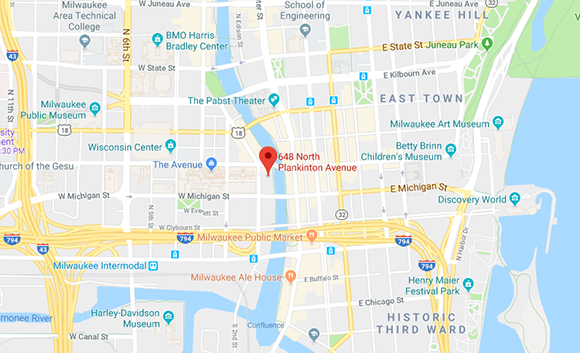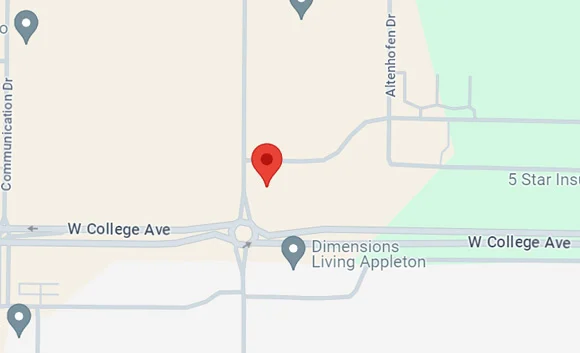Practice Areas:
Green Bay Dog Bite Lawyer
Last updated on July 14, 2025
A calm afternoon walk or a visit to a friend’s home can turn traumatic when a dog suddenly attacks. Severe injuries like puncture wounds, nerve damage, and facial scarring are common. Lindner Law, LLC, with experienced personal injury attorneys, steps in right away to protect your rights and secure every dollar you need for treatment, lost wages, and emotional recovery.
Green Bay’s parks, waterfront trails, and densely settled neighborhoods keep people and pets in close quarters. Local animal control logs show dozens of bite reports each year, many involving children who never saw the danger coming. After more than three decades serving Brown County, our firm knows the leash laws, vaccination rules, and medical specialists who handle complex reconstructive care. We use that knowledge from day one.
Why Lindner Law Is the Smart Choice After a Dog Bite
Wisconsin Focus
Our attorneys practice personal injury law only in Wisconsin. Familiarity with every statute and recent court decision lets us counter the defenses insurers raise most often.
Record of Significant Recoveries
Tens of millions of dollars collected for injured clients statewide prove that meticulous documentation and trial readiness bring full value settlements.
No Fee Without Success
You pay nothing up front. We advance investigation costs, expert fees, and court filing expenses, then take a share of the recovery when we win. If we do not win, you owe nothing.
Local Insight
We know which Green Bay neighborhoods generate the most animal control calls, which surgeons provide reliable future-care estimates, and which insurance adjusters handle dog bite claims. Local knowledge speeds resolution and raises settlement offers.
Client-First Communication
Every client gets a direct line to the attorney and paralegal, same-day call backs, and flexible evening or weekend meetings. If injuries limit mobility, we visit your home or hospital room.
How Wisconsin Dog Bite Law Protects You
Strict liability
Wisconsin law holds dog owners strictly liable when their dog injures someone even if the animal had no prior history of aggression. You do not need to prove negligence. If you were bitten, the owner is legally responsible. This means that if a dog injures someone or damages property, the owner of the dog has a legal duty of care, and a breach of duty is implied in such cases, making them automatically responsible for compensating the victim. Such laws aim to ensure that pet owners are accountable for their animals’ actions and encourage responsible pet ownership. By holding owners strictly liable, the statute prioritizes the safety and well-being of the public while emphasizing the importance of proper pet training and supervision. Additionally, this law serves to protect individuals from potential harm inflicted by dogs and provides a legal recourse for those affected by such incidents.
Double damages for repeat offenders
In cases where a dog has a history of biting, the legal implications are significant due to the owner’s negligence. A second injury victim who has been bitten by the same dog can potentially claim double the full value of compensatory damages from the dog’s owner. This emphasizes the importance of conducting a thorough investigation to verify if the dog has previously bitten someone and consider any necessary legal action. Early verification of a prior bite, particularly in relation to common injuries sustained, is crucial in establishing liability and ensuring that victims receive appropriate compensation for their injuries. Additionally, understanding the circumstances surrounding any previous bites can help determine if there are patterns of aggressive behavior that need to be addressed to prevent future incidents.
Three-year filing deadline
It’s important to note that in cases of animal bites, including dog bites, the timeline for filing a lawsuit is crucial. Typically, victims are required to initiate legal proceedings within three years of the bite incident. However, there may be exceptions for minors, who might have until they reach age twenty to file a suit. Acting promptly is essential not only for complying with legal deadlines but also for preserving crucial evidence related to the incident. This evidence can play a significant role in supporting the victim’s case and seeking appropriate compensation for damages incurred due to the bite.
Modified comparative negligence
Even if the insurance company claims you provoked the dog, you can still recover damages as long as you were not more than 50% at fault. We gather witness statements, medical records, and expert opinions to show the attack was unprovoked and prevent unfair blame. Our objective is to demonstrate that the attack was unprovoked and entirely avoidable. By presenting evidence to support this claim, we aim to secure a favorable outcome and hold the responsible party accountable for their actions. It is essential to gather witness testimonies, medical records, and any other relevant documentation to build a strong case in favor of the victim. Additionally, consulting with legal experts who specialize in animal attack cases can provide valuable insights and guidance throughout the legal process.
Common Dog Bite Injuries
Deep lacerations and puncture wounds
Dog teeth pierce skin and muscle, driving bacteria deep into tissue. Emergency care includes irrigation, antibiotics, and tetanus boosters, followed by careful monitoring for infection.
Nerve damage leading to loss of sensation or movement
Bites to hands, arms, or legs can sever sensory and motor nerves. Nerve-graft surgery or tendon transfers may restore limited function, but recovery often lasts a year or longer.
Scarring and disfigurement, especially on the face and hands
Visible scars affect confidence and employment. Plastic surgeons may recommend layered closure, dermabrasion, and laser therapy over several months to soften scar appearance.
Infections such as rabies, tetanus, or sepsis
Roughly one in five dog bites becomes infected. When vaccination status is unknown, victims undergo a rabies series. Intravenous antibiotics and possible surgical cleaning stop systemic spread.
Crush injuries to bones and joints
Large breeds can exert over 400 pounds per square inch, fracturing arms, wrists, and facial bones. Surgery and months of therapy are often required for recovery.
Emotional trauma and fear of animals
Flashbacks, nightmares, and panic around dogs are common. Counselors use cognitive therapy and gradual exposure to rebuild confidence and restore normal sleep.
Key Evidence in a Dog Bite Claim
Animal control reports
When dealing with a dog bite incident, obtaining the officer’s notes, vaccination status of the dog involved, and any relevant citations is crucial. These documents serve as concrete evidence that confirms the occurrence of the bite and any potential legal violations that may have occurred. The officer’s notes can provide detailed information about the circumstances surrounding the incident, while verifying the vaccination status of the dog ensures that necessary precautions are taken to prevent the spread of diseases. Additionally, citations issued in relation to the incident can shed light on any negligence or violations of animal control laws that may have contributed to the situation. By compiling and reviewing this documentation, it becomes easier to determine the appropriate course of action and ensure that all parties involved are held accountable for their actions.
Prior-incident documentation
When it comes to proving previous attacks for insurance claims, various sources of information can be utilized. Municipal databases can provide details about reported incidents or complaints regarding animal attacks in specific areas. Veterinarian records may contain documentation of injuries sustained by pets due to previous attacks. Additionally, earlier insurance claims filed as a result of animal attacks can serve as concrete evidence to support current claims and potentially unlock double damages. By compiling and presenting this data, claimants can strengthen their cases and improve their chances of receiving appropriate compensation for the damages incurred.
Veterinarian quarantine paperwork
Ten-day confinement records are essential documents that indicate whether the necessary rabies monitoring was carried out and definitively establish the identity of the dog in question. These records play a crucial role in ensuring public safety and preventing the spread of rabies. By documenting the confinement period, authorities can track the health status of the dog and verify compliance with regulations. In cases where there is a suspected rabid animal or a potential exposure incident, these records provide valuable information for public health officials and veterinarians to assess the risk and take appropriate action. Additionally, accurate record-keeping helps to protect both humans and animals by facilitating timely interventions and follow-up measures as needed.
Progressive wound photography
High-resolution photos taken during the emergency room visit and subsequent follow-up appointments play a crucial role in monitoring the healing process, detecting any signs of infection, and assessing the potential for permanent scarring. These detailed images provide healthcare professionals with valuable insights into the progression of the injury or condition, allowing them to make informed decisions about treatment protocols and adjustments. By documenting the changes in the patient’s condition over time, these photos serve as a visual timeline of recovery that can aid in evaluating the effectiveness of medical interventions and ensuring optimal outcomes for the patient’s long-term well-being.
Medical and psychological records
Medical records are a crucial component in connecting every symptom to the medical condition or attack being investigated. They typically include a variety of documents such as charts, imaging results, surgeon notes detailing procedures performed, evaluations from counseling sessions, and prescriptions given to the patient. These records provide a comprehensive overview of the patient’s health history and treatments received, aiding healthcare professionals in diagnosing and treating the individual effectively.
Homeowner or renter insurance policy data
We request the full declaration page from every relevant policy to confirm the named insured, policy period, and precise liability limits. The page lists any animal exclusions or breed restrictions that could affect coverage, as well as sublimits for medical payments versus personal liability. By reviewing endorsements we can identify umbrella or excess policies that raise available funds, determine whether the landlord’s policy also applies, and spot coverage gaps that may require pursuing the owner’s personal assets. Knowing these details early allows us to set a demand that matches the true pool of insurance money, negotiate from a position of strength, and decide whether trial is necessary to access additional coverage layers.
Damages You Can Recover
Medical expenses
A comprehensive damage claim starts with the invoices you already have: ambulance fees, emergency-room evaluation, wound irrigation, tetanus and rabies prophylaxis, diagnostic imaging, and initial suturing. From there we add costs for follow-up visits, intravenous antibiotics to stop infection, plastic-surgery revisions many months later, occupational or physical therapy to restore hand strength and range of motion, prescription pain medication, and any assistive devices such as compression garments or silicone scar sheets. Finally, we obtain written opinions from your surgeons and therapists that outline probable future treatments, including additional laser sessions or nerve-graft procedures, so the settlement accounts for expenses that have not yet arrived.
Lost wages and reduced earning capacity
We gather pay stubs, direct-deposit records, and employer HR statements to calculate every paycheck you missed while recovering or attending medical appointments. If ongoing weakness, stiffness, or visible scarring limits your duties, we commission a vocational expert to compare pre-injury earnings with what you can earn in the labor market now. That expert prepares a lifetime projection that converts lost promotions, reduced hours, or forced career changes into present-day dollars, ensuring your award reflects both short-term income gaps and long-term earning loss.
Physical pain and suffering
We gather pay stubs, direct-deposit records, and employer HR statements to calculate every paycheck you missed while recovering or attending medical appointments. If ongoing weakness, stiffness, or visible scarring limits your duties, we commission a vocational expert to compare pre-injury earnings with what you can earn in the labor market now. That expert prepares a lifetime projection that converts lost promotions, reduced hours, or forced career changes into present-day dollars, ensuring your award reflects both short-term income gaps and long-term earning loss.
Emotional distress and loss of enjoyment of life
Beyond physical pain, many victims of dog bites wrestle with psychological injuries and physical injuries, as well as psychological trauma such as flashbacks, nightmares, or panic attacks when they hear barking. Children may avoid playgrounds; adults might decline outdoor events or social gatherings where dogs could appear due to a significant risk of infection. Licensed counselors document these effects, and we supplement their notes with testimony from family, friends, and co-workers who have observed changes in your mood, social activity, and personality. The goal is to quantify the invisible but very real psychological toll of the attack.
Permanent disfigurement compensation
Scars on highly visible areas such as the face, neck, or dominant hand can influence self-confidence, social interaction, and job prospects. Plastic-surgery specialists supply scar-rating scales and projected revision outcomes, while cosmetology or human-resources experts explain how noticeable disfigurement may restrict professional roles. These analyses support a separate line item that compensates for both aesthetic impact and the practical limitations imposed by permanent scarring.
Punitive damages
When an owner knowingly violates leash laws, disregards prior warnings, or allows a dog with a documented history of aggression to roam, Wisconsin courts can award damages meant solely to punish and deter. We collect prior citation records, neighbor complaints, and veterinary warnings to prove conscious disregard for public safety. Presenting this evidence increases leverage during negotiation and, when necessary, persuades a jury to impose an additional monetary penalty that goes beyond standard compensation.
Steps to Take After a Dog Bite in Green Bay
Seek medical attention immediately
Rapid cleaning lowers infection risk, and early records link injuries to the attack.
Report the incident to animal control
An official report triggers rabies quarantine and creates a time-stamped record.
Identify and photograph the dog and owner
Pictures of the animal, collar tags, and any vehicle help prevent future identity disputes.
Collect witness contact information
Statements about leash status and owner behavior strengthen liability claims.
Preserve damaged clothing and items
Store torn garments or broken glasses in sealed bags. They may carry DNA evidence and show bite force.
Avoid detailed discussions with insurers
Provide only basic facts until you speak with an attorney.
Contact Lindner Law, LLC promptly
We secure surveillance video, witness statements, and quarantine records while evidence is fresh.
Our Five-Phase Approach
- Free strategy consultation
We review medical records, answer questions, and set realistic timelines. - Through investigation
Investigators gather animal control files, prior bite evidence, and witness interviews. - Medical collaboration
Collaboration with physicians and counselors projects future care and emotional recovery needs. - Targeted negotiation
A detailed demand package supported by expert statements pressures insurers to resolve the claim promptly. - Litigation and resolution
If negotiations stall, we file suit in Brown County Circuit Court and push for an early trial date, often prompting settlement before the first hearing.
Frequently Asked Questions
What if the dog was leashed?
A leash by itself does not excuse an owner from responsibility. Wisconsin’s strict liability statute focuses on whether the animal caused harm, not on the length or presence of a tether. Courts look at control, which means the owner’s ability to prevent the dog from lunging, snapping, or breaking free. If the leash was too long for crowded sidewalks, if the owner allowed slack while chatting with friends, or if a child was holding the leash and could not restrain the animal, liability remains. Our investigation reviews local leash ordinances, witness accounts, and any video evidence to show that reasonable control was missing.
Can I claim damages if the bite happened on private property?
Yes. Strict liability follows the dog, not the location. Whether you were invited for coffee in a living room, delivering a package on a porch, or repairing an appliance in a basement, the owner still bears responsibility. The only narrow exception involves trespassing with criminal intent, which rarely applies. Homeowner or renter insurance usually covers incidents on the property, so you can recover medical costs, lost income, and other damages even when the bite occurs behind closed doors.
Will my neighbor pay personally?
In most cases compensation comes from insurance, not the neighbor’s wallet. Homeowner, renter, or landlord policies include personal liability coverage that pays legal fees and settlements up to stated limits. We request the declaration page to confirm coverage and search for any umbrella policy that adds an extra layer of protection. Personal assets come into play only if the owner’s coverage is unusually low or if punitive damages exceed policy limits, which is uncommon.
What if the owner denies the attack?
Denial is common when owners fear insurance premiums rising or a beloved pet being labeled dangerous. We counter by collecting emergency room records that describe bite patterns, gathering statements from eyewitnesses, and securing surveillance video from doorbells or nearby businesses. For disputed identity we can arrange DNA testing on saliva left on torn clothing. Strict liability means the burden to disprove involvement falls on the owner once we present credible evidence, so a blanket denial rarely succeeds.
How long does a dog bite case take?
An uncomplicated claim with clear liability and modest injuries often settles within six to eight months after medical treatment is complete. Cases with severe scarring, nerve repair, or staged plastic surgery usually remain open until doctors determine final outcome, sometimes a year or more. Disputed liability, missing insurance information, or a crowded court docket can extend the timeline. We push for prompt resolution but never close a case until future medical needs and long term effects are fully understood and documented.
When should I hire a dog bite attorney?
You should hire a dog bite attorney or an experienced personal injury lawyer as soon as possible after an incident occurs. This ensures you receive expert legal guidance to navigate your case effectively and explore your legal rights and options. An experienced attorney can help you understand your rights, gather evidence, and negotiate with insurance companies to secure the maximum compensation you deserve.
Begin Your Recovery Today
Dog bites leave physical and emotional scars that can last a lifetime. Let Lindner Law, LLC handle the legal battle while you focus on healing.
Call (920) 882-4860 or submit our online case evaluation form for a free consultation. You pay nothing unless we win, and one conversation can give you a clear plan forward.
Related Blog Posts
Does Homeowners’ Insurance Cover Dog Bite Injuries in Wisconsin?
Dog bites can result in serious injuries, emotional trauma, and steep medical expenses. In Wisconsin, if you’re bitten by someone else’s dog, you may wonder who is financially responsible and how to cover the cost of treatment. In many instances,
Dog bite safety in Wisconsin
On Behalf of Lindner Law, LLC | May 16, 2025 | Dog Bites Dog bites, no matter where they happen, can be serious safety issues. Popular places like Bay View Dog Park, Runway Dog Exercise Area and Memorial Park attract
Dog bite myths debunked: Separating fact from fiction
On Behalf of Lindner Law, LLC | Apr 29, 2025 | Dog Bites Dog bites can cause serious injuries, but many misconceptions about them can make it harder to understand the true risks. It’s easy to assume that certain breeds














